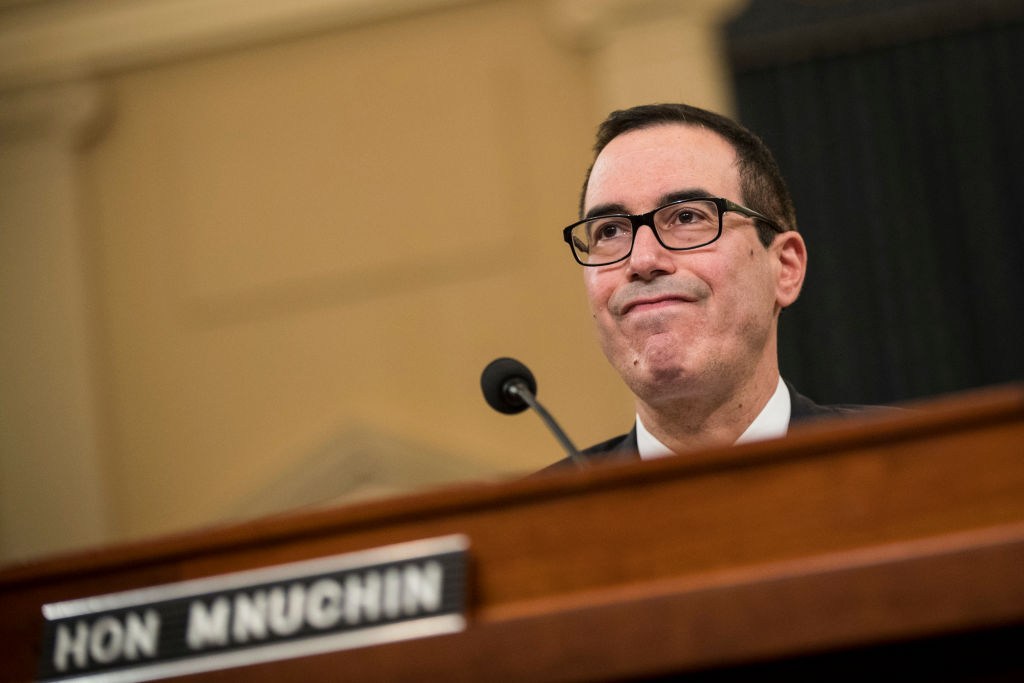The Trump administration is proposing a huge tax cut for the rich that bypasses Congress


A free daily email with the biggest news stories of the day – and the best features from TheWeek.com
You are now subscribed
Your newsletter sign-up was successful
The Treasury Department is considering changing the definition of "cost" in determining how the IRS calculates capital gains, or investment income, effectively handing a $100 billion tax cut to the wealthiest Americans without approval from Congress. Treasury Secretary Steven Mnuchin told The New York Times he's considering allowing capital gains to be adjusted for inflation, and "if it can't get done through a legislation process, we will look at what tools at Treasury we have to do it on our own and we'll consider that."
Conservatives have long pushed for indexing capital gains to inflation, and White House National Economic Council director Larry Kudlow is a longtime proponent. But efforts to enact it in Congress have faltered, in part because more than 97 percent of the benefits would go to the top 10 percent of income earners and two-thirds would go to the top 0.1 percent, according to independent analyses. The George H.W. Bush administration considered and rejected making the change by regulatory fiat in 1992, judging that such a move wouldn't survive court challenge.
The Times explains how indexing capital gains to inflation would work:
The Week
Escape your echo chamber. Get the facts behind the news, plus analysis from multiple perspectives.

Sign up for The Week's Free Newsletters
From our morning news briefing to a weekly Good News Newsletter, get the best of The Week delivered directly to your inbox.
From our morning news briefing to a weekly Good News Newsletter, get the best of The Week delivered directly to your inbox.
Currently, capital gains taxes are determined by subtracting the original price of an asset from the price at which it was sold and taxing the difference, usually at 20 percent. If a high earner spent $100,000 on stock in 1980, then sold it for $1 million today, she would owe taxes on $900,000. But if her original purchase price was adjusted for inflation, it would be about $300,000, reducing her taxable "gain" to $700,000. That would save the investor $40,000. [The New York Times]
Indexing capital gains to inflation would lower federal tax revenue by $102 billion over a decade, according to a Wharton School of Business analysis, and the Congressional Research Service said in July that any economic stimulus from the change would be canceled out by additional federal debt, already growing rapidly due to the GOP's recent $1.5 trillion tax cut.
A free daily email with the biggest news stories of the day – and the best features from TheWeek.com
Peter has worked as a news and culture writer and editor at The Week since the site's launch in 2008. He covers politics, world affairs, religion and cultural currents. His journalism career began as a copy editor at a financial newswire and has included editorial positions at The New York Times Magazine, Facts on File, and Oregon State University.
-
 6 of the world’s most accessible destinations
6 of the world’s most accessible destinationsThe Week Recommends Experience all of Berlin, Singapore and Sydney
-
 How the FCC’s ‘equal time’ rule works
How the FCC’s ‘equal time’ rule worksIn the Spotlight The law is at the heart of the Colbert-CBS conflict
-
 What is the endgame in the DHS shutdown?
What is the endgame in the DHS shutdown?Today’s Big Question Democrats want to rein in ICE’s immigration crackdown
-
 TikTok secures deal to remain in US
TikTok secures deal to remain in USSpeed Read ByteDance will form a US version of the popular video-sharing platform
-
 Unemployment rate ticks up amid fall job losses
Unemployment rate ticks up amid fall job lossesSpeed Read Data released by the Commerce Department indicates ‘one of the weakest American labor markets in years’
-
 US mints final penny after 232-year run
US mints final penny after 232-year runSpeed Read Production of the one-cent coin has ended
-
 Warner Bros. explores sale amid Paramount bids
Warner Bros. explores sale amid Paramount bidsSpeed Read The media giant, home to HBO and DC Studios, has received interest from multiple buying parties
-
 Gold tops $4K per ounce, signaling financial unease
Gold tops $4K per ounce, signaling financial uneaseSpeed Read Investors are worried about President Donald Trump’s trade war
-
 Electronic Arts to go private in record $55B deal
Electronic Arts to go private in record $55B dealspeed read The video game giant is behind ‘The Sims’ and ‘Madden NFL’
-
 New York court tosses Trump's $500M fraud fine
New York court tosses Trump's $500M fraud fineSpeed Read A divided appeals court threw out a hefty penalty against President Trump for fraudulently inflating his wealth
-
 Trump said to seek government stake in Intel
Trump said to seek government stake in IntelSpeed Read The president and Intel CEO Lip-Bu Tan reportedly discussed the proposal at a recent meeting
